Effective ASP .NET MVC Development Services
With the world attaining milestones in technological advancements with each passing day, it is time to keep up with the frameworks that ultimately contribute to the success of your business. You might be thinking that – Why do I need to know this when I can simply hire a developer or an agency and left them to deal with it? Sure, you can do that.
There are numerous agencies and companies that offer excellent services and ensure that all the requirements of your business are fulfilled to the last minute detail. However, as the owner of a business, you must know all the behind-the-scene works. Just imagine how great the communications could be with you and the team you are hiring if you have the core knowledge about it? Think about it!
Apart from business owners, amateur developers starting their careers also need to be aware of the various frameworks. Only if you know the intricate details can you work on honing your skill. Owing to the rising popularity of the Asp Net MVC Development in the building of web applications, it is necessary to arm yourself with sufficient knowledge about it. Here, you will find detailed information regarding ASP.NET MVC development.
What is ASP.NET MVC development?
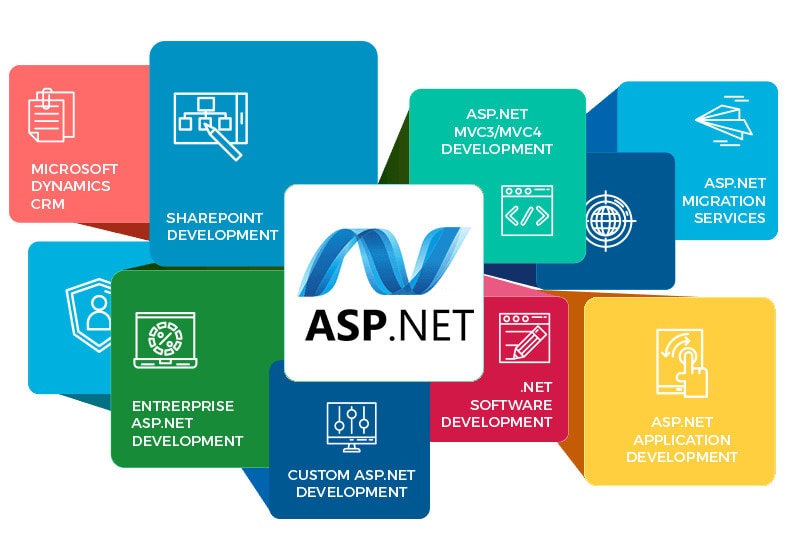
ASP.NET MVC is a web development lightweight framework that is developed by Microsoft. The software is open source and offers an alternative to the ASP.NET Web Forms. The MVC architectural pattern, the existing features of the ASP.NET platform, and the recently updated information from the Agile development has contributed to the massive popularity of this framework. It is usually used in the platform of web applications that either employs HTML or XHTML.
The design of the framework is in such a way that it can easily integrate smoothly into the already existing ASP.NET characteristics, including authentication, master pages, authorization, etc. The recent version of this highly testable framework is MVC 5. News of the next version, which is MVC 6, was around for a long time. However, Microsoft has since confirmed that MVC 6 was discontinued, because of the development of Core. Instead of releasing MVC 6, the brand is now planning to merge core with .NET 5, and release it.
With the implementation of the MVC (Model, View, and Controller) architectural pattern, ASP.NET MVC has aided the developers with a pattern-based option when it comes to building unique websites. The framework separates Business logic, Database, and UI. It also offers absolute control over the HTML generated. ASP.NET MVC web applications can be developed by using Visual Studio.
Easy management of the complexity of web development and it being lightweight due to the Razor engine has increased its popularity among MVC developers. Another factor for its popularity is that the MVC architecture provides quite a high level of flexibility in terms of development, maintenance, design, and testing.
Why was ASP.NET MVC developed?
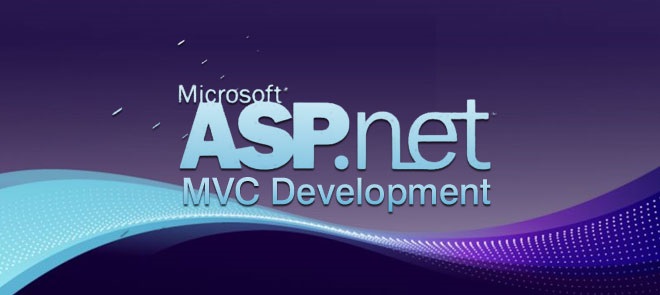
To understand why the asp MVC web development was needed, it is vital to understand the basics of the .NET framework. The framework that is used by Microsoft to build any type of software applications pertaining to console, desktop, or web is termed as the .NET framework. The .NET framework contains numerous classes, which are used by the developers to build various types of software applications.
Now, the ASP.NET framework is a part of this vast .NET framework. Microsoft uses the ASP.NET framework to specifically build web applications. There are two frameworks that Microsoft uses while building web applications – ASP.NET MVC and ASP.NET Web Forms. Now, it is vital that you keep in mind that the ASP.NET MVC is an alternative to the ASP.NET Web Forms, but is not its replacement. Various developers prefer different frameworks based on their features and the need of the developer.
Now the question that must be popping in your mind is that if ASP.NET Web Forms were relatively successful, what was the need to develop ASP.NET MVC? While the success attained by the ASP.NET Web Forms is undeniable, there was also an issue surrounding the framework. Its performance was often in question. To resolve those issues and ensure that the framework delivers excellent performance, ASP.NET MVC was developed. There are several parameters that define the performance of a web application. The attributes are –
1) Code-behind class re-usability
2) Issues with response time
3) Customization of HTML
4) Issues regarding Unit Testing
While ASP.NET MVC Web Forms faced difficulties when it came to the above-mentioned parameters, the developers took that into consideration and ensured that the newly developed ASP.NET MVC passed those parameters with flying colors.
Differences between ASP. NET MVC and ASP.NET Web Forms
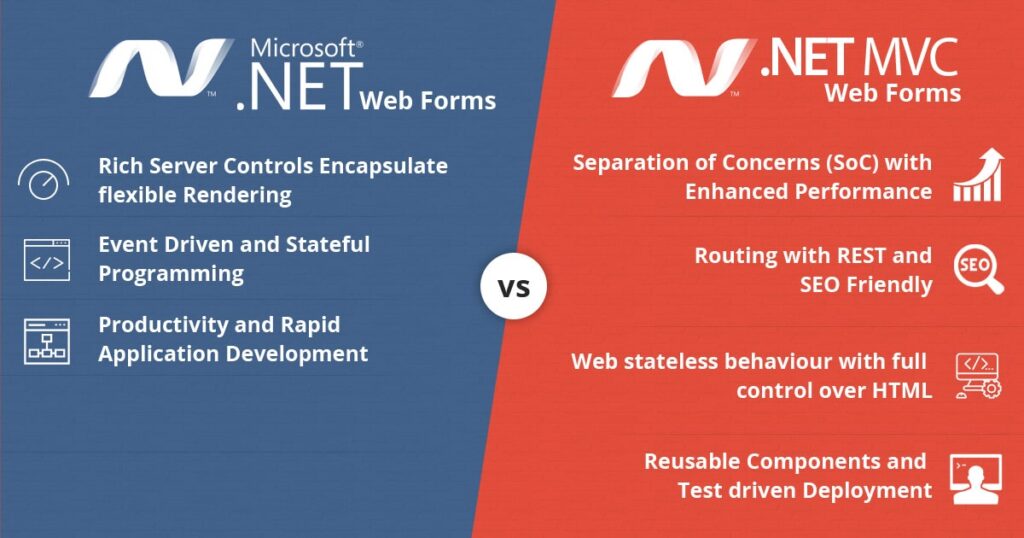
There are various features that differentiate the ASP.NET MVC from the ASP.NET Web Forms. It is vital to know about them in detail before you decide which one suits your needs the most for hiring an MVC development agency. Some of the differences are elaborated below.
The primary point of difference between the two frameworks is its date of origin. The web form framework was released in the year 2002, and the MVC framework was released after seven years, in the year 2009. However, the foremost difference between the two is the model they use. While AVC.NET Web Forms use the event-driven development model, the AVC.NET MNV uses the MVC architectural pattern development model.
The next point of difference is the type of URL these frameworks have. The ASP.NET MVC has URLs that are route-based. It simply means that the URLs are redirected to actions and controllers. In the case of ASP.NET Web Forms, the URLs are file-based. It means that the file name must exist both physically as well as in the URLs.
The next parameters are the view type and syntax. In regards to ASP.NET Web Forms, the views and logic are coupled together. It also follows the Web Forms Syntax. In the case of ASP.NET MVC, the logic and views are separated, and the framework follows the customizable syntax.
Another factor that is almost always considered by the developers is the control over HTML. The ASP.NET MVC offers full control over generated HTML. But, the ASP.NET Web Forms offer comparatively less control over the HTML generated.
The next factors that further distinguish the frameworks are code re-usability and state management. In the case of ASP.NET Web Forms, user controls are offered for re-usability of code. It also provides automation in state management. However, in the ASP.NET MVC, there are partial views when it comes to code-re-usability, and state management is manual.
What to consider while choosing between ASP. Net MVC and ASP.net Web Forms

Both ASP.NET MVC and Asp.NET Web forms have distinct advantages and disadvantages. What may be a beneficial feature to one developer might come off as a drawback to another. The primary factor that determines which framework to use is the business prospective and the team members that are given the job of working with a particular framework.
There are mainly two factors that you must keep in mind while choosing any of the two frameworks. These are –
- Unit Testing: If your business venture is more suited to automatic unit testing, then it is advisable to opt for the ASP.NET MVC.
- Rapid Application Development (RAD): If you have a limited timeframe and budget, then your best bet is the ASP.NET Web Forms. They can be developed rapidly with use and do not even need much maintenance.
Apart from these two factors, you must jot down all the requirements of your project, and then tally them, with the advantages and disadvantages of ASP.NET Web Forms and ASP.NET MVC. This must be done before hiring an MVC development company.
However, if you are a developer, you need to ask yourself several questions that will aid you in choosing the desired path. The foremost question that you must ask is whether your team has experience with ASP.NET MVC and Asp.NET Web Forms. You have to take this into account that the ease with which your team can deal with either framework is crucial in the successful development of a web application.
And, finally, you need to decide if you want a good performance and reuse the input logic. If the answer is yes, then you can move forward with ASP.NET MVC. But, if the answer is negative, then ASP.NET Web Forms is the one for you.
Different versions of ASP.NET MVC
Microsoft has released several versions of the ASP.NET MVC. Some of them are discussed below.
ASP.NET MVC 1
The first ever version of the ASP.NET MVC was released, on the 13th of March, in the year 2009. Along with this, Visual Studio 2008 was also released so that developers can use it to develop the ASP.nET MVC 1. This framework runs on the .NET 3.5. It combined the MVC architecture pattern with the Web Form Engine. The most appealing features were – Ajax Helpers, HTML control, Routing, Unit testing, etc.
ASP.NET MVC 2
The second version of the ASP.NET MVC was released, on the 10th of March, in the year 2010. It runs on both .NET 3.5 as well as .NET 4.0. Microsoft Visual Studio 2008 can be used to develop the framework. The various features that were integrated are UI helpers along with automatic scaffolding, templated helpers, templates that are open to customization, and many more. The framework also supported Data Annotations Attributes so that model validation can be applied on both the sides – server and client.
ASP.NET MVC 3
The next version of the ASP.NET MVC was made available to the public on the 13th of January in the year 2011. This particular version runs only on .NET 4.0. Microsoft Visual Studio 2010 was also released so that the framework can be easily developed. Some interesting features included the Razor view engine and improved Data Annotations Attributes for better model validation on the server as well as the client side. The framework also used NuGet for delivering software and allows the management of dependencies on the platform. This version was also integrated with enhanced JavaScript support along with JSON binding and jQuery Validation.
ASP.NET MVC 4
The fourth version of the ASP.NET MVC was released on 15th August, 2012. It is compatible with both Microsoft Visual Studio 2010 and Visual Studio 202. This specific framework runs on .NET 4.0 and .NET 4.5. Changes have been made to default the various project templates. Some of the primary features included were – minification, use of jQuery Mobile for Mobile project template, bundling, task support, etc.
ASP.NET MVC 5
The fifth version of the ASP.NET MVC was launched on the 17th of October in the year 2013. It runs on .NET 4.5 and .NET 4.5.1. Microsoft Visual Studio 2012 and Visual OneASP.NET can be used to develop the framework. Some new features of this version were – scaffolding, attribute routing, bootstrap, overriding of filters, ASP.NET identity, etc. The latest version of ASP.NET MVC is the ASP.NET MVC 5.2.7, which was released, on 29th November 2018. Since then, Microsoft has discontinued the MVC versions.
Various features of ASP.NET MVC

ASP.NET MVC has several features that have ensured its popularity among the website developers. It is vital to know about them in detail in order to enhance your knowledge of the ASP.NET MVC development. Some of them are listed below.
- It integrates with the previously existing functionalities of the ASP.NET framework seamlessly. Some of the functionalities are Master Pages, User Controls, Authorization, Data Binding, Authentication, ASP.NET Routing, etc.
- It is usually favored when developing lightweight but complex web applications.
- View State is not used in the framework. It aids in the building of web applications and also offers absolute control to the developers.
- The existence of a framework that is both pluggable as well as extensible and can be customized. Integration of third-party tools or customizing the ones that are present can be done with ease.
- It supports the testability and the test-driven development of the MVC architectural pattern. It is because each of the components is viable to be designed by using an interface and can be tested with the use of mock objects.
- Complex web applications can be handled with relative ease owing to the MVC architectural pattern. Different developers can work on different components due to the separation of logic.
- The process is quite simple and offers support in terms of parallel development.
Benefits of ASP.NET MVC
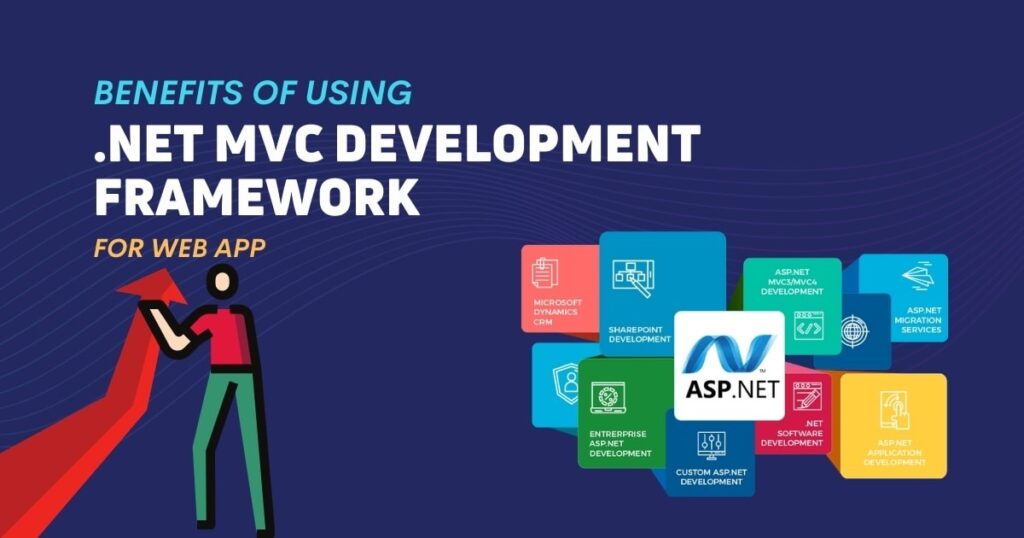
The numerous benefits associated with ASP.NET MVC have made it an absolute favorite among the website developers. Knowing about them in detail will assist you in making major decisions while deciding on an asp net MVC development company. The various advantages are discussed below.
Use of the already existing features of the ASP.NET framework
This is a major advantage of the ASP.NET MVC. Since it is built on the ASP.NET framework, developers can easily use the advantageous features like caching, windows authentication, masters page, profile state management, etc. The use of these features has made the MVC version a total hit with the developers.
Enhancement of performance
Due to the lack of support of the view state, the ASP.NET MVC does not offer automatic state management. It, in turn, reduces the size of the page. But, conversely, it improves the performances to a great extent.
Separation of various application tasks
In the ASP.NET MVC, the application tasks, including UI logic, business logic, and input logic and separated. In this framework, all the core components have an interface-based design. It can also be tested using simulated objects. It provides another benefit, which is a flexible and quick unit testing.
Customization
The entirety of the ASP.NET MVC is designed in a way that all its components can be customized with ease. You can change it according to your requirement, or you can simply replace it with a third-party tool. The framework also supports the plugging of various tools like view engine, policy if URL routing, etc. The design of the framework also permits the support of Inversion of Control (IOC) and the Dependency Injection (DI) container models.
Routing Support
ASP.NET MVC is designed to offer support to URL naming patterns, which are often used in the case of SEO optimization. The framework also does not need the URLs to have file-name extensions or physical existence.
Control over HTML
The lack of support of server controls in the ASP.NET MVC is a boon in disguise. It ensures that the developer has no choice but to use the input controls of HTML. It further indicates that the developers have full control over the final HTML generated. Also, the integration of third-party libraries related to JavaScript like jQuery is relatively easy.
Drawbacks of ASP.NET MVC
No matter how brilliantly a framework is designed, drawbacks are a part of it. It motivates the developers to brainstorm and find ways to eradicate the shortcomings. However, there are also some disadvantages which cannot be solved. Before making the decision to hire MVC developer, you must also be aware of some of the drawbacks of the framework.
Difficulty in learning
Lack of View State and the model of event-driven programming make it difficult for developers who have do not have enough in the field of development of web applications. It will take time, and you must be patient as the level of difficulty is quite high. You also must have knowledge regarding the MVC architectural pattern.
The issue regarding the design
There is no option for viewing the preview of the design page. You also have to run the program each time you want to see the actual design. It can soon become tiresome and lead to more complications. Furthermore, understanding the application flow can quite hard.
Quite expensive
It is vital to note that despite being open-source, ASP.NET MVC is quite expensive. You need to have the budget for several expenses like windows server license, SQL server license, and many more. Moreover, the maintenance of the framework is costly too, as you will need to use more resources pertaining to a web server.
The core of ASP.NET needs more work
Most developers have this major issuer and have cited grievances against the 100% result of basic features like Data Access. It seems that the core of ASP.NET needs to have more upgradations for the better.
Details regarding the architectural pattern of MVC
In order to understand the ASP.NET MVC framework, you must be knowledgeable about the architectural pattern of the MVC software development. It is based on the methods of the separation of components. The MVC model comprises of three main parts – Model, View, and Controller that are interconnected with each other.
Model
This component of the pattern deals with the logic that is related to data. Now, this data can be any business data related to logic, or it can be the data that is transferred between the components of Controller and View. It obtains and then stores the model state in a particular database. For instance, the product object can gather information needed from a specific database and work on it. Then, it can write information to the area of products, which is located in the SQL server.
View
The view component is responsible for dealing with the UI logic. For instance, the Customer view has several UI components like dropdown, text boxes, pop-ups, which is based on the recent state of both the object and the product.
Controller
The Controller mostly acts as a buffer between the components of View and Model. It processes all the incoming requests, modifies data via the Model, and then uses the View for interaction to provide the final result. For instance, the Customer controller manages the inputs using the Customer View and then ensures that the database is updated with the aid of the Customer Model.
Things to Know When Using ASP.NET MVC
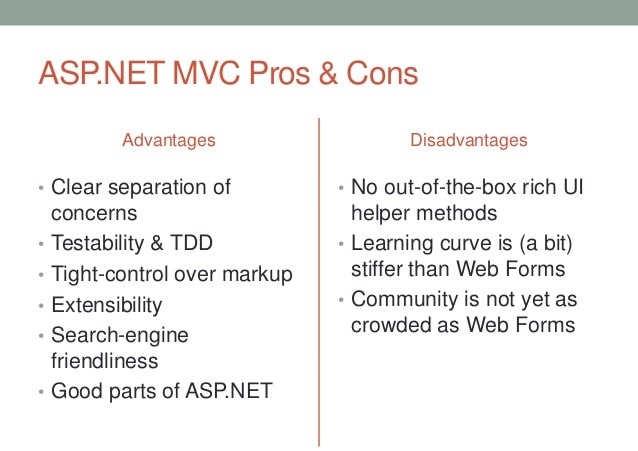
As already mentioned, ASP.NET MVC is mainly an open-source framework used for web development. This is a part of Microsoft, and it helps in providing Model View Controller architecture, which is useful for various web development purposes. ASP.NET also acts as an alternative way to ASP.NET web that can be used for making web applications.
If you are not ware, then ASP.NET is a portion of the .NET platform that can be used for running, developing, as well as building various web applications. Using CSS, jQuery, and HTML, it is easy to develop various applications. When dealing with MVC development, you will able to understand every aspect of ASP.NET MVC, and how various web apps are developed using this.
Reasons behind choosing ASP.NET MVC
Indeed, the different web forms are quite successful, yet Microsoft came up with the plan of developing ASP.NET MVC. But, the only problem that still exists with AVP.NET MVC is its performance. Perhaps, due to this reason, ASP.NET MVC lost its popularity over the years. When working with different web applications, there are certain things or aspects, which help in defining its performance.
Response time issues, code-behind class reusability, Unit Testing Problem are some of the aspects that help in defining the problems. ASP.NET MVC shows great performance or results depending on the aforementioned factors. Most MVC based web application requires all these factors and therefore while developing web applications these factors are required to be kept in mind at all times.
Applications that can be developed using the .NET framework

It is quite clear that software development has witnessed massive revolutions. The popularity of the .NET framework has already turned out to be one of the most raved frameworks that come with the end number of advantages. Web application development is one of the popular platforms where the .NET framework has been used extensively. ASP.NET has turned out to be one of the popular .NET framework types for all the web app developers Among the other changes, the biggest one to consider is the usage of MVC patterns that can be used for software development as well as web apps. MVC patterns help in separating inputs, application output, and processing.
Most ASP NET MVC developers are of the view that whenever you hear the concept of .NET, the first thing that comes to is things related to various networked applications. But, it is not true since there are a lot of different things that can be done with the help of .NET. Here are some of the uses of the .NET framework.
ASP.NET web applications
These are some of the programs which are used for running inside various web servers just to fulfill user requests on HTTP. ASP.NET web applications have a lot of variety, it begins from normal websites that have HTML pages and ends till modern enterprise applications. These enterprise applications mostly run on remote networks. Such enterprise applications even provide various components for data exchange through XML.
Windows applications
The daily desktop applications that you use on the Windows platform are also developed through the .NET framework. All these applications are designed in a way so that it runs only under the Windows environment. Such applications take the help of various services that are provided by Windows.
Windows services
These services are the applications that run for long hours on Windows that too as a background process. It is important to keep in mind that such applications do not harm the working of any other processes running on the same machine.
What new has come up in ASP.NET Core MVC?
According to some of the application developers, Microsoft has overhauled the pre-existing ASP.NET MVC framework and came up with a new version. So, with the help of new version app, developers can have huge flexibility, and get competitive advantages for all the high-end applications.
The flexibility of open source
As ASP.NET Core is a completely open-source platform, it helps in maintaining modularity for various project development so that the process of coding becomes easy. When it comes to ASP.NET development, it gives the flexibility to include libraries as well as framework components that are necessary for the deployment of applications. If you want, you can add .NET Core liabilities and ASP.NET Core Framework libraries according to the various project requirements.
Better cloud deployment support
It is necessary to understand that in the new version of ASP.NET Core MVC, the cloud deployment support has been made better because of the modular architecture of the latest framework. ASP.NET Core MVC helps in providing a flexible environment as well as extended modularity, which helps in designing and developing applications that are already prepared for cloud deployment.
Helps with hosting independence
With the ASP.NET Core application, the developed applications can be easily run on various web servers apart from Internet Information Services, which was not applicable in the case of ASP.NET application. As per various web application developers, this became possible since ASP.NET Core helps in supporting cross-platform and so it became impossible to keep all the applications dependent just on Internet Information Service.
Compulsory skills to look out for when hiring ASP.NET Developers
Since ASP.NET is a framework important for web development, it is necessary that whoever you are hiring for the process must have all the required information. He must know various languages such as C+, Java, ASP.NE, etc. Here are some of the skills that you must look out for in an ASP.NET developer before hiring.
Proper knowledge on ASP.NET MVC
It is one of the crucial knowledge when it comes to hiring ASP.NET development companies, it is necessary to check that the developer you are getting is having complete information regarding all the aspects of ASP.NET. This will help in making things beautiful as well as safe web applications. Since it is easy to use, ASP.NET MVC is increasingly gaining popularity and spreading throughout the web market.
The developer has MCSD certification
No matter what company you are opting for, make sure that the developer you are hiring has a Microsoft Certified Solutions Developer certificate. This acts as an approval that the developer that you have hired has all the important information regarding ASP.NET. So, you can be assured of the fact that the developer will take care of the requirements, and will develop a full proof web application.
Have a clear understanding of Object-Oriented Programming
The concept of Object-Oriented Programming plays a significant role for developers. It is a basic skill and every fresher must have information regarding OOP. So, before you are hiring any MVC developer, make sure that he has complete knowledge on OOP otherwise, he is not ready for handling any project. The concept of Object-Oriented Programming includes everything regarding generalization, dependency, inheritance, and composition. After all, you do not want any amateur to handle your work and ruin everything.
Work experience
Last but not least, experience matters a great deal when it comes to ASP.NET. If a developer does not have at least three to four years of minimum work experience, then he might not be ready to handle important projects.
Therefore, when dealing with ASP.NET MVC, its whereabouts, and how it works, make sure that you have every information about it. Although Microsoft is no longer involved with it, still it is in use and works perfectly for designing web applications.

